| Article ID | Journal | Published Year | Pages | File Type |
|---|---|---|---|---|
| 5554501 | European Journal of Pharmacology | 2017 | 13 Pages |
The influenza virus (IV) is a highly contagious virus causing seasonal global outbreaks affecting annually up to 20% of the world's population and leading to 250,000-500,000 deaths worldwide. Current vaccines have variable effectiveness, and, in particular during a pandemic outbreak, they are probably not available in the amounts needed to protect the world population. Therefore we need effective small molecule drugs to combat an IV infection and that can be produced, in case of pandemic, rapidly and in large quantities. Unfortunately, natural occurring IV becomes more and more resistant to current anti-IV drugs. And thus, there is an urgent need for development of alternative agents with new mechanisms of action. This review provides an overview of the pharmacology and effectiveness of new anti-IV agents, focusing on inhibition mechanisms directed against virus-host interactions.
